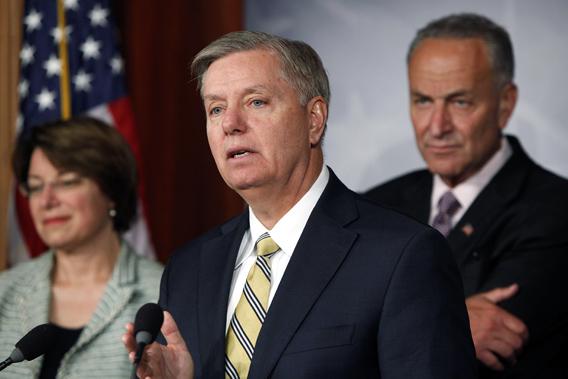The verdict in the Pfc. Bradley Manning trial came down a little after 1 p.m., not an ideal time for members of the U.S. Senate. Democrats and Republicans were meeting for their weekly lunches, and when they exited, around 2 p.m., most of them pled ignorance of the WikiLeaks source’s fate—guilty of violating the Espionage Act, guilty of stealing government property, acquitted of “aiding the enemy.”
Only the disappointed senators seemed willing to dish. “I’m very surprised by the verdict,” said Maine Sen. Susan Collins, ranking member of the Homeland Security committee and one of the Republicans on the Select Committee on Intelligence. “I believe the information he disclosed was extremely harmful to our country. It is not in the same category as [Edward] Snowden’s betrayals, but it’s very serious nonetheless. I respect the judgment, even though I find it hard to believe.”
North Carolina Sen. Richard Burr, another member of the intelligence committee, cheered himself with the guilty verdicts. “Clearly if you look at the other charges, many of which he pleaded guilty to, there’s a substantial amount of jail time that’s probably triggered—probably at least 20 years,” said Burr. “I’m more focused now on trying to find Snowden, and trying to get him in front of the judicial process, but I think this should discourage other leakers. I don’t think anybody wants to serve jail time.”
The dream of dissuading future leakers had been a goal all along—the executive branch’s goal, and the Senate’s. Convicting Manning of violating the Espionage Act was the sort of win Intelligence Committee Chairwoman Sen. Dianne Feinstein had wanted all along. “The Supreme Court has held that its protections of free speech and freedom of the press are not a green light to abandon the protection of our vital national interests,” she argued in 2010, at that time making the case for prosecuting Julian Assange, the man who took Manning’s information and spread it online. Assange called today’s verdict “the first ever espionage conviction against a whistleblower” and “a dangerous precedent and an example of national security extremism.”
But it wasn’t a new definition or precedent on “aiding the enemy.” The government had argued that Manning possessed an “evil intent” when he burned diplomatic cables onto CDs then handed the information to the Assange organization. It cited, for example, the case of Pvt. Henry Vanderwater, a treacherous soldier in the Union army who’d given a command roster to a Confederate newspaper. And had the government won, someone who revealed information later used by, say, al-Qaida, would have been as legally liable as someone who passed secrets directly to the terrorists.
The government didn’t win. The legislators and spymasters who insist that Manning was a traitor—and that Snowden is a traitor too—have a weaker case today. Feinstein insisted that Snowden “violated his oath,” and thus committed “treason.” Over in Fort Meade, Col. Denise Lind has declared that Manning didn’t truly intend to aid the enemy. That’s a major setback for intel hawks (or whatever you can call these people), because despite the outrage generated on the Hill, there’s no real momentum for legislation to further criminalize leaking. A brutal judgment from Lind was the best they could have hoped for, and this one wasn’t brutal enough.
So Manning’s critics gritted their teeth and praised the court. “I’m not saying WikiLeaks was the enemy,” said Collins today. “I’m saying that the information revealed was helpful to those who do not wish us well. “
Sen. Lindsey Graham, a former JAG lawyer, declined to second-guess the judgment from Fort Meade. “I think it’s a logical consequence that the enemy might pick up the information leaked here, but I think the statute is written that you have to intend that,” he said. “But I can understand why the judge ruled that way, and I think the process has been fair. I respect the court’s decision. I think he should have been tried for all the crimes, including aiding the enemy. The process worked, didn’t it?”
Graham headed out of the Capitol on a hopeful note. “This is one of the more serious things that I’ve seen a military member do in 30 years,” he said. “I hope people who say he’s a hero see they’re misguided in terms of what a hero might be.”
